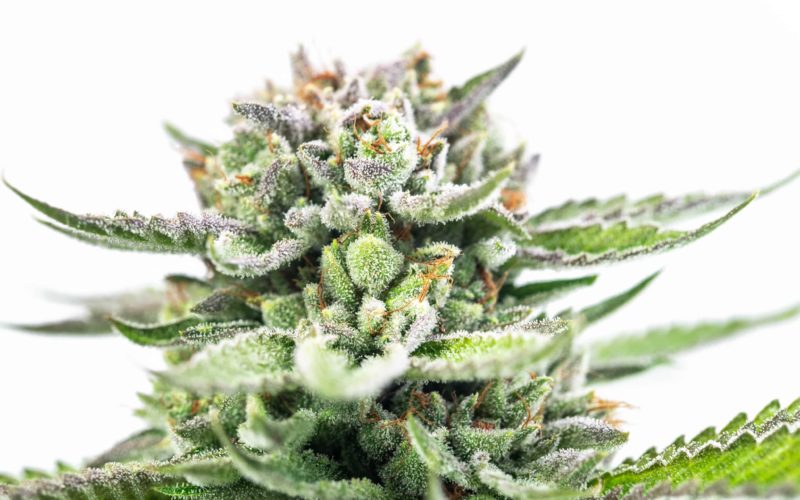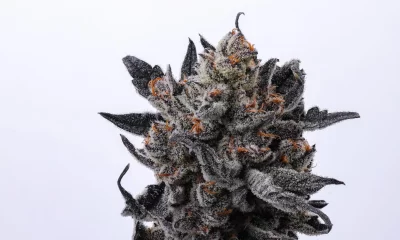News
Louisiana University Gains Approval to Conduct Cannabis Research and Testing

A bill passed by state lawmakers allows the School of Pharmacy at the University of Louisiana Monroe to conduct research into cannabis and hemp and provide lab testing services to the medical marijuana industry.
The University of Louisiana Monroe School of Pharmacy has gained the approval to conduct cannabis testing and research under legislation passed last month by state lawmakers. Under the bill from state Representative Mike Echols, ULM will become the third university in Louisiana authorized to perform research into cannabis and hemp.
“Louisiana State University and Southern University have been the only two schools in the state that can do research around hemp and marijuana but not anymore,” Echols said. “We were able to add to some of the bills flowing through the process to give ULM the opportunity to do some of that strategic research.”
The legislation also allows the School of Pharmacy to provide lab testing services for purity and potency to the state’s medical cannabis industry. Echols said that his bill amends Louisiana’s medical marijuana statute to allow the university to provide laboratory testing services and study new applications for cannabis and hemp.
“They have the School of Pharmacy at ULM, the state’s only publicly-funded school of pharmacy…and so there was a real key relationship between some of the products that are being produced out there now, and the new pharmaceutical products that could be produced. We wanted ULM to have a chance to do some research in that space,” he explained.
Echols said that the facility will create new jobs at ULM and up to $1 million in revenue from testing services alone, with research into new applications for cannabis and hemp providing additional economic opportunities.
“Now, as far as pharmaceutical research goes, if they are able to find new drugs and new potential for that particular strain then there’s … unlimited potential,” Echols told local media.
New 20-Acre Research Facility To Be Built
ULM’s cannabis testing and research operations will be carried out at a 20-acre facility that is a collaboration between the School of Pharmacy and the non-profit Biomedical Research and Innovation Park (BRIP). The new research park will provide a home for hemp and cannabis research and testing services and other scientific enterprises. BRIP board member Susan Nicholson noted that while the project is in the early planning stages, developers expect the new research facility will require about $35 million in funding. The engineering and construction phase of the park is scheduled to begin early next year.
“The endgame is to try and work with researchers at ULM College of Pharmacy to build a number of facilities to enhance what we have at the school of pharmacy facility with biomedical developments,” said Nicholson. “That is when we will begin mapping out the road system for the facility, which is where we’ll be starting first. It should happen fairly quickly.”
The new facility will position the ULM School of Pharmacy to conduct state-of-the-art cannabis research, which Nicholson says is expanding nationwide.
“There are too many positive potential usages in various drug protocols to pass up,” she said. “The discoveries that are being made in hemp and marijuana research about its uses and proven medical benefits are too great not to move forward.”
Dr. Ray Armstrong, another BRIP board member, said that hemp is a very versatile resource, with companies interested in exploring applications including fiber and hempcrete, which he said is “even stronger and lighter than concrete.”
Echol’s bill requires the state to conduct oversight of the universities conducting cannabis research and the partners they collaborate with.
“The contractor selected by the licensed university through a competitive bid process to cultivate, extract, process, produce and transport therapeutic marijuana shall be subject to oversight and inspections by the Louisiana Department of Health,” reads the text of the legislation.
Under the legislation, the health department’s oversight responsibilities include requirements for the inspection of research facilities, inventory reporting, security and compliance with state building, plumbing, and electrical codes.
Echols’ legislation, House Bill 697, was passed by the Louisiana state legislature and signed into law by Governor John Bel Edwards in June. The bill goes into effect on August 1.
Business
New Mexico cannabis operator fined, loses license for alleged BioTrack fraud

New Mexico regulators fined a cannabis operator nearly $300,000 and revoked its license after the company allegedly created fake reports in the state’s traceability software.
The New Mexico Cannabis Control Division (CCD) accused marijuana manufacturer and retailer Golden Roots of 11 violations, according to Albuquerque Business First.
Golden Roots operates the The Cannabis Revolution Dispensary.
The majority of the violations are related to the Albuquerque company’s improper use of BioTrack, which has been New Mexico’s track-and-trace vendor since 2015.
The CCD alleges Golden Roots reported marijuana production only two months after it had received its vertically integrated license, according to Albuquerque Business First.
Because cannabis takes longer than two months to be cultivated, the CCD was suspicious of the report.
After inspecting the company’s premises, the CCD alleged Golden Roots reported cultivation, transportation and sales in BioTrack but wasn’t able to provide officers who inspected the site evidence that the operator was cultivating cannabis.
In April, the CCD revoked Golden Roots’ license and issued a $10,000 fine, according to the news outlet.
The company requested a hearing, which the regulator scheduled for Sept. 1.
At the hearing, the CCD testified that the company’s dried-cannabis weights in BioTrack were suspicious because they didn’t seem to accurately reflect how much weight marijuana loses as it dries.
Company employees also poorly accounted for why they were making adjustments in the system of up to 24 pounds of cannabis, making comments such as “bad” or “mistake” in the software, Albuquerque Business First reported.
Golden Roots was fined $298,972.05 – the amount regulators allege the company made selling products that weren’t properly accounted for in BioTrack.
The CCD has been cracking down on cannabis operators accused of selling products procured from out-of-state or not grown legally:
- Regulators alleged in August that Albuquerque dispensary Sawmill Sweet Leaf sold out-of-state products and didn’t have a license for extraction.
- Paradise Exotics Distro lost its license in July after regulators alleged the company sold products made in California.
Golden Roots was the first alleged rulebreaker in New Mexico to be asked to pay a large fine.
Source: https://mjbizdaily.com/new-mexico-cannabis-operator-fined-loses-license-for-alleged-biotrack-fraud/
Business
Marijuana companies suing US attorney general in federal prohibition challenge

Four marijuana companies, including a multistate operator, have filed a lawsuit against U.S. Attorney General Merrick Garland in which they allege the federal MJ prohibition under the Controlled Substances Act is no longer constitutional.
According to the complaint, filed Thursday in U.S. District Court in Massachusetts, retailer Canna Provisions, Treevit delivery service CEO Gyasi Sellers, cultivator Wiseacre Farm and MSO Verano Holdings Corp. are all harmed by “the federal government’s unconstitutional ban on cultivating, manufacturing, distributing, or possessing intrastate marijuana.”
Verano is headquartered in Chicago but has operations in Massachusetts; the other three operators are based in Massachusetts.
The lawsuit seeks a ruling that the “Controlled Substances Act is unconstitutional as applied to the intrastate cultivation, manufacture, possession, and distribution of marijuana pursuant to state law.”
The companies want the case to go before the U.S. Supreme Court.
They hired prominent law firm Boies Schiller Flexner to represent them.
The New York-based firm’s principal is David Boies, whose former clients include Microsoft, former presidential candidate Al Gore and Elizabeth Holmes’ disgraced startup Theranos.
Similar challenges to the federal Controlled Substances Act (CSA) have failed.
One such challenge led to a landmark Supreme Court decision in 2005.
In Gonzalez vs. Raich, the highest court in the United States ruled in a 6-3 decision that the commerce clause of the U.S. Constitution gave Congress the power to outlaw marijuana federally, even though state laws allow the cultivation and sale of cannabis.
In the 18 years since that ruling, 23 states and the District of Columbia have legalized adult-use marijuana and the federal government has allowed a multibillion-dollar cannabis industry to thrive.
Since both Congress and the U.S. Department of Justice, currently headed by Garland, have declined to intervene in state-licensed marijuana markets, the key facts that led to the Supreme Court’s 2005 ruling “no longer apply,” Boies said in a statement Thursday.
“The Supreme Court has since made clear that the federal government lacks the authority to regulate purely intrastate commerce,” Boies said.
“Moreover, the facts on which those precedents are based are no longer true.”
Verano President Darren Weiss said in a statement the company is “prepared to bring this case all the way to the Supreme Court in order to align federal law with how Congress has acted for years.”
While the Biden administration’s push to reschedule marijuana would help solve marijuana operators’ federal tax woes, neither rescheduling nor modest Congressional reforms such as the SAFER Banking Act “solve the fundamental issue,” Weiss added.
“The application of the CSA to lawful state-run cannabis business is an unconstitutional overreach on state sovereignty that has led to decades of harm, failed businesses, lost jobs, and unsafe working conditions.”
Business
Alabama to make another attempt Dec. 1 to award medical cannabis licenses

Alabama regulators are targeting Dec. 1 to award the first batch of medical cannabis business licenses after the agency’s first two attempts were scrapped because of scoring errors and litigation.
The first licenses will be awarded to individual cultivators, delivery providers, processors, dispensaries and state testing labs, according to the Alabama Medical Cannabis Commission (AMCC).
Then, on Dec. 12, the AMCC will award licenses for vertically integrated operations, a designation set primarily for multistate operators.
Licenses are expected to be handed out 28 days after they have been awarded, so MMJ production could begin in early January, according to the Alabama Daily News.
That means MMJ products could be available for patients around early March, an AMCC spokesperson told the media outlet.
Regulators initially awarded 21 business licenses in June, only to void them after applicants alleged inconsistencies with how the applications were scored.
Then, in August, the state awarded 24 different licenses – 19 went to June recipients – only to reverse themselves again and scratch those licenses after spurned applicants filed lawsuits.
A state judge dismissed a lawsuit filed by Chicago-based MSO Verano Holdings Corp., but another lawsuit is pending.
Source: https://mjbizdaily.com/alabama-plans-to-award-medical-cannabis-licenses-dec-1/
-

 Business2 years ago
Business2 years agoPot Odor Does Not Justify Probable Cause for Vehicle Searches, Minnesota Court Affirms
-

 Business2 years ago
Business2 years agoNew Mexico cannabis operator fined, loses license for alleged BioTrack fraud
-

 Business2 years ago
Business2 years agoAlabama to make another attempt Dec. 1 to award medical cannabis licenses
-

 Business2 years ago
Business2 years agoWashington State Pays Out $9.4 Million in Refunds Relating to Drug Convictions
-

 Business2 years ago
Business2 years agoMarijuana companies suing US attorney general in federal prohibition challenge
-

 Business2 years ago
Business2 years agoLegal Marijuana Handed A Nothing Burger From NY State
-

 Business2 years ago
Business2 years agoCan Cannabis Help Seasonal Depression
-

 Blogs2 years ago
Blogs2 years agoCannabis Art Is Flourishing On Etsy













